USA Midwest Progressive Rock (1970’s/early 80s)
In the 1970s, within the American Midwest and Ontario, there existed a fascinating subculture that was distinctly their own – and this phenomena was sharply expressed in the music of the region.
It was here in the early 1970s that unmitigated FM radio ruled supreme, and countless Baby Boomers checked in each night to hear some of the wild music coming from Europe during this time (especially in England). Yes and ELP were an enormous influence in the region, as was the relatively obscure Gentle Giant. Certainly Genesis and Van Der Graaf Generator had their disciples as well. Some import shops even brought in those crazy albums coming from Germany, France, and Italy, though it’s debatable how influential any of those bands were within the region.
I could probably write a dissertation on the topic (I won’t), but the economic situation of the early 1970s, coupled with an enormous shift in demographics between the inner city and the suburbs, caused major unrest within the area. The Great Lakes region was the manufacturing center of both the US and Canada, and the Unions ruled supreme. But as jobs were being shipped overseas, and the employment began to dwindle, as well as social changes such as higher taxes, forced busing, and government housing – a certain cynicism began to creep within the adult population. Meanwhile the youth were enamored with the new free culture brought about by the late 1960s social change. And so it came about that indeed, yes it’s true: Sex, drugs, and rock and roll became the predominant themes of the region. The kids had no desire to follow in their father’s footsteps and work at the auto factory, but rather many were interested in white collar careers (or even better – become a rock star). And as such, the colleges of the area (the Big Ten Conference in particular) were booming with some of the brightest minds in America. While the Midwest was certainly not unique for all of the above traits, it seems in retrospect to be a microcosm of the entire 1970s experience.
“Progressive in spirit, but grounded and conservative enough to realize that to have any chance at a recording contract, some compromises would be required.”
So with a rebellious and free spirited youth, one that was academically focused (at least in ambition), and with a music scene in the early 1970s at its zenith regarding creativity – it was only natural that 1000’s of budding musicians took to the garage to create their own artistic progressive rock masterpieces. If nothing else, there would be girls right? Since FM radio was huge in the area, and the corporations were already gaining control of the medium, it was becoming more and more apparent that commercially accessible pop music was to be expected. So it is with this combination we hear the region’s primary sound: Progressive in spirit, but grounded and conservative enough to realize that to have any chance at a recording contract, some compromises would be required.
Some bands never got past the beer and weed stage. While some others struck the big time and were headlining acts worldwide for years to come. In between these extremes, were the hundreds of acts that made a sincere go at it. Some actually released fully realized albums, others got demos out, while the remaining are distant memories of but a few. Some of the bands were more commercially oriented, while others threw caution to the wind and went for broke. I’ll try to capture them all here.
A recent documentary (2014) has surfaced on the “miracle” of Kansas emerging as headliners worldwide. Nothing could illustrate my list better than watching this. I highly encourage any of you to record from your cable system or buy the DVD and check it out. It really underscores the entire scene at that time.
Now for some regional parameters: The US Census Bureau defines the Midwest region to include the following 12 states: Illinois, Indiana, Iowa, Kansas, Michigan, Minnesota, Missouri, Nebraska, North Dakota, Ohio, South Dakota, and Wisconsin. Chicago (Illinois) is the largest city in the American Midwest and the third largest in the US. Chicago and its suburbs are BY FAR the largest Metropolitan Statistical Area (MSA) in the region, followed by Detroit (Michigan), Minneapolis / St. Paul (Minnesota), St. Louis (Missouri), Cleveland (Ohio), and Kansas City (Missouri). Other major cities of the region include Indianapolis, Columbus, Cincinnati, Milwaukee, and Omaha. For the purposes of this list, I’m including Western Pennsylvania (Pittsburgh) and Northern Kentucky (Louisville) as they are economically and spiritually similar to the other cities and states listed here. As well, the Ontario province in Canada (with its primary city Toronto) has a similar economic and cultural backdrop and shares much in common with their Great Lakes brethren in the US.
This is not meant to be an exhaustive list of every band that recorded from the Midwest in the 1970s. The focus is on those that went for a progressive rock sound. As with any list, there are going to be many outliers that will no doubt cause controversy. Some are on the pop side of the continuum, while others may be more straightforward hard rock (another style that boomed in the 1970s). For example, I’m not going to include bands like REO Speedwagon, Survivor, Head East, or Triumph to mention a few. I’ve set the time frame for this list to approximately 1971-1983.
If you think I missed a group, please feel free to make suggestions.
Previously I sorted the list by popularity followed by progressivity. I’ve decided to change things around and list alphabetical by State (followed by Canada) as a different way to view the list.
Be sure to read the last entry, where I have listed many outliers, before making similar suggestions.
Illinois
Albatross (Albatross, 1976) (Rockford)
Rockford, Illinois based symphonic progressive group. Like many bands from the great Midwest, Albatross were highly infatuated with Wakeman era Yes, with dashes of Gentle Giant and Genesis thrown in. And like Surprise (St. Louis), Ethos (Ft. Wayne), Pentwater (Chicago), Starcastle (Champaign) and countless others, they also had an eye on the FM radio charts. This AOR sensibility guaranteed them more club spots, and hopefully in their delusional minds, more girls to choose from. In the end, they fit somewhere between the insane progressive sounds of Yezda Urfa (south Chicago suburbs of Indiana) to the more overtly commercial Styx (south Chicago). If you love the sounds of the region, as I do, then this one is a must own. Lots of organ and mellotron for you gearheads out there as well.
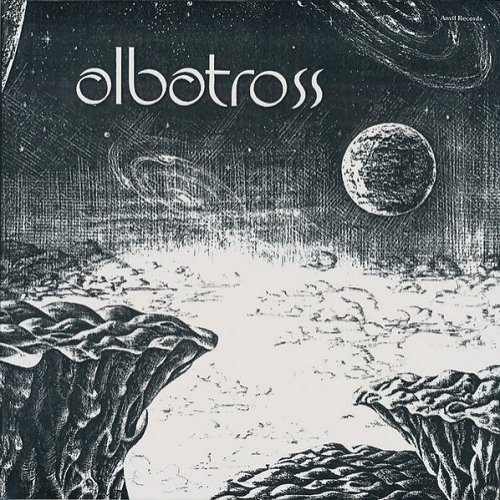
Ariel (Perspectives, 1985) (Chicago)
From the far south Chicago suburbs, comes the super obscure Ariel, an album that is just now making its sound heard worldwide. Early 80s Rush is the most obvious first influence, but there’s more here than meets the ear as it were. All instrumental guitar, keys, and drums are the core components, and the compositions are complex and tight – with a strong fusion influence. No escaping the King Crimson sound from the era either, but also (surprisingly) Doldinger’s Passport, minus the sax (imagine the sequencer heavy Moog lines for example). If we were to really deep dive here, I would compare Ariel to fellow Chicagoan’s Proteus, mixed with the UK group Red (on Jigsaw). While Side 1 is impressive enough, the final three tracks do nothing short of wow the listener. And they close with their peak composition, always a hallmark of a great album. Ariel does not belie its mid 80s sound (despite the somewhat psych influenced guitar tone), and yet compared with the normal dreck from the era, the band proves the middle 80s were not a total wasteland (heavy metal genre exempted of course). This one deserves the buzz its currently receiving in the underground.

Graced Lightning (The Graced Lightning Side, 1975) (Chicago)
An exceptionally well done instrumental progressive rock album by this obscure group from Chicago. Recorded only to one side of the LP, there are 3 tracks totalling 18 minutes. And not a moment wasted. Excellent keyboards/piano, coupled with inventive guitar solos. At times the music is very complex. Doesn’t sound like anyone really, except maybe Virginia’s Polyphony from a few years prior.
Mistral (Fortune of War, 1982) (Chicago)
Mistral were a band from the north Chicago area who released one album on cassette and disappeared into obscurity. 25 some years later they resurfaced and ultimately reissued the album themselves on CD-R.
It would appear the blueprint for the band would be Saga, who were chart topping during this time. The music has a similar early 80s MTV rock vibe, with plenty of synthesizer work – and quite good at that. The guitarist has a bit of a hard rock streak especially in the solo department, yet another parallel with those from up north of the border. The vocalist has a strong resemblance to Ian Anderson, and thus the Jethro Tull comparisons are frequent, but honestly the music doesn’t indicate otherwise. The shorter songs are pretty straightforward (and dull to be honest), but the longer ones show that Mistral had a few decent ideas up their sleeve, thus earning their progressive rock badge.
Where it breaks down is the production and choice of tones. The drums are horrid sounding, hollow and lifeless. The guitar – other than when soloing – has that toothless riffing that was somewhat prominent in the early 80s FM world. As a veteran of the cassette tape culture that was predominant in England during this time, my ears have built up tolerance for this kind of production. But even by those low standards, Mistral comes up short. It’s the worst aspect of the 80s and it’s all over this recording like an XLarge dress.
The band talked of reformation, and it would seem that had they pulled it off, their newer recordings would have been so much better. Well, it’s never too late…
Neuron (For What We Are, 1980) (Chicago)
Chicago based AOR / Latin rock / progressive blend similar to Ethos’ more commercially oriented efforts. The Boston band Hot Flash would be another reference. More commercial sounding than most from the region.
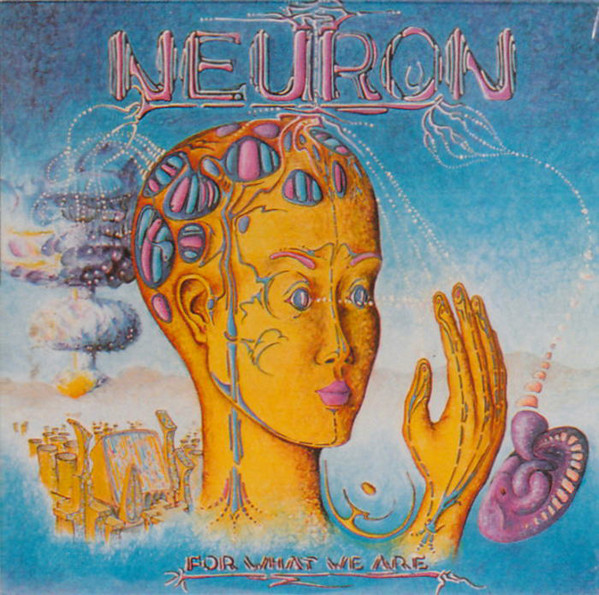
Pentwater (Pentwater, 1977 | Out of the Abyss, 1992) (Chicago)
Pentwater are a classic US Midwest progressive band – a style best characterized as a deft combination of AOR friendly melodies with tight, thoughtful progressive textures and meters. At times Pentwater’s LP is along the lines of a more complex Styx, but there’s also the strong tight counterpoint influence of post Power and the Glory (Gentle Giant). And one instrumental suite is right out of ELP’s Tarkus playbook, which recalls their archival (and frankly much better) Out of the Abyss album. A definite winner for those who want more albums like Ethos and Albatross.
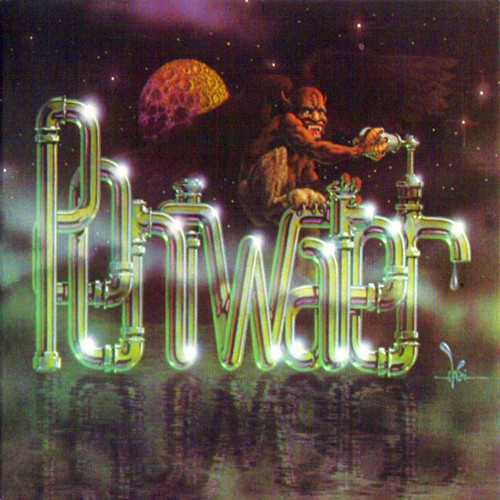
Out of the Abyss is off-the-rails hyper complex mid 1970’s US progressive rock. If you like non stop complexity similar to Yezda Urfa and Mirthrandir, then this album is for you. It certainly is for me! Get ready for a brain-load.
As with the Neuschwanstein that was recently posted, I also managed to get a more formal review of this album out for I/E back in 1993. The below is that review, though updated and cleaned up a bit:
About a year ago I was talking to Greg Walker, head of Syn-Phonic, and asked “What’s your next project?”. He replied “Pentwater”. “PENTWATER!” I cried. “What’s so progressive about Pentwater?” I already knew of their sole 1978 album, and while good, it wasn’t great. Greg quickly responded “No buddy, not their album but some awesome unreleased stuff !” Well, the CD is out, and Out of the Abyss proves Mr. Walker was right. In a big way. Pentwater (who hail from the Chicago area) are but another example of how awesome the underground progressive scene was in America. It’s really a shame that the major labels were (and still are) too focused on pop radio airplay potential to recognize where the true talent lies. But hey, all progressive rock is pompous, pretentious, corporate-fed, getting-away-from-rock-n-roll’s-original-intentions mumbo jumbo right? It’s true, read your Rolling Stone Record Guide…
Pentwater’s music is quite similar to other superb American bands like Cathedral, Easter Island, and Mirthrandir. As with the aforementioned bands, Pentwater play an extremely complex and intricate music that embodies the best parts of the English masters like Yes, Gentle Giant, Genesis, and King Crimson yet in no way plagiarizes their music. The 8-minute ‘EM 54’ that opens this CD demonstrates just how involved a work this is – a constant barrage of sounds, ideas, and instruments are all tossed and turned to deliver an overwhelming, yet always exciting, piece. The first 2 minutes must of taken a month to write and record alone! Aside from traditional rock instrumentation, this highly talented 6-piece play flute, harpsichord, Mellotron, Mini-Moog, oboe, Theremin, violin, and assorted percussion ranging from anvils (?!) to tubular bells. Pentwater began in 1970 and lasted until 1978 (the year of their LP). The material for this CD was taken from 1973-76. During their existence they recorded 54 songs from which, according to Mr. Walker, future projects will come about.* Good deal.
Frank Pisani (Sky, 1977) (Chicago)
So who the heck is Frank Pisani? No idea. Just some schmuck from Chicago we are lead to believe. It’s presumed to be the same Frank Pisani that has (had) a music and comedy act. But in 1977 he wasn’t clowning about, but rather getting down to the serious business of releasing commercially accessible music for FM radio. BUT, in what seems to be a unique 1970s Midwest American trait, he was throwing in plenty of complicated progressive ideas and measures. As if to ensure to himself that, at the very least – YES – I am a serious musician. For that alone, Frank, the record companies will ignore you. Duh. As Dave Stewart of National Health (and other groups of course) once famously said about music executives: “We don’t want music to get in the way of a Top 10 hit!” And so a desolate Frank sent in his tapes through some esteemed and academic music magazine like Creem or Circus, had his demos pressed up for a tax dodge label, and received absolutely nothing in return. And he probably never even knew the album came out. In fact, it’s entirely possible he will learn right here on the CDRWL – some 35+ years later. It’s actually happened before…
If you blindfolded me, and then asked me to name the time and place – I’d say Midwest 1977. Seriously. Such a bulls-eye for the entire insane genre. As I state in the premise for the list: “In the 1970s, within the American Midwest and Ontario, there existed a fascinating subculture that was distinctly their own – and this phenomena was sharply expressed in the music of the region. It was here in the early 1970s that unmitigated FM radio ruled supreme, and countless Baby Boomers checked in each night to hear some of the wild music coming from Europe during this time (especially in England). Yes and ELP were an enormous influence in the region, as was the relatively obscure Gentle Giant. Certainly Genesis and Van Der Graaf Generator had their disciples as well.”
Jamming Hammond, loud electric guitar, high energy rhythms, rough and bluesy but-oh-so-sincere vocals, and…. cowbell. Yea, there’s a little too much crooning at times, and there’s that always present party-time Grand Funk Railroad sound, but that only adds to the vibe. Man, this is just a heck of a lot of fun. Probably ties closest to the Canadian band Dillinger, though I hear serious references to classic Kansas as well. And how about that cover? The marketing department worked overtime on that obviously. “Here’s a sheet of Engineering Graphics paper. Make it work.” Ya know, minimum wage didn’t get you much in 1977 either.
Seiche (Chicago)
One of the few bands listed here that I think were influenced by Rush. Excellent hard rock influenced progressive.
Starcastle (Starcastle, 1976) (Champaign-Urbana)
We mentioned in our prologue that Yes was a major influence on bands from the region. We also stated that many of these bands originally worked – or met in – the college circuit. Starcastle epitomizes these two elements. Generally derided as nothing more than a “Yes clone” nowadays in progressive rock chat forums, this list alone should prove that there were for more variables at play here than simple plagiarism. There can be no doubt that Starcastle had front row seats to the Relayer tour, but they also have that distinct American touch in the songwriting. Some will say watered-down, and perhaps that’s not far from the truth – but getting on the radio was extremely important to any band who wanted a shot at success. And no local band was going to be afforded the opportunity to release a ‘Gates of Delirium’ type opus. Their gambit paid off, as Starcastle could only be considered a grand success in this scenario. They were signed to a major label and had a nice 4 album run, though their pathetic attempts at pop music so as to “stay in the game” at the end of the line were fruitless. And into obscurity they went, with a couple of reunion efforts that pleased only the hardcore faithful.
Those who write-off Starcastle as merely Yes clones, are the same ones who would do similar with Eskaton sounding like Magma. It’s an easy comparison, makes for a populist styled review, and everyone goes home happy – satisfied in their self-assessed deep historical knowledge on the subject, along with sycophantic approval from other strictly-topical naysayers. Indeed if learning how to write in the first grade is the same as your college term paper, then the logic proves true.
Every band has influences their merge into their own music. Yes themselves borrowed from many a source to come up with their unique sound recipe. Now Starcastle comes along, takes the Yes recipe as a base, and distills it even further. Druid in England were doing the same thing at the same time, except to critical approval. The USA, while never having our own progressive rock scene like Europe, really took a shine to good ole Yes in the 1970s. So if you were to put together a band during that time, Yes was likely your first choice as an influence. It just so happens that Starcastle actually made a bit of a commercial mark doing it, thus subjugating themselves to years of undeserved ridicule by those who consider the Rolling Stone Record Guide a contemporary gospel that cannot be questioned, lest you too be tagged with a Scarlet M (for Moron) on your hard earned Fragile concert T-shirt.
As I state under the Starcastle entry on the list above: There can be no doubt that Starcastle had front row seats to the Relayer tour, but they also have that distinct American touch in the songwriting. Some will say watered-down, and perhaps that’s not far from the truth – but getting on the radio was extremely important to any band who wanted a shot at success. And no local band was going to be afforded the opportunity to release a ‘Gates of Delirium’ type opus. Their gambit paid off, as Starcastle could only be considered a grand success in this scenario.
In reality, Starcastle weren’t the “bloated corpse” (says the music critics, not I) of Yes’ sprawling album side suites – but rather it was a more direct sound, similar to The Yes Album. There’s more Tony Kaye than Rick Wakeman here, that’s for sure.
I would highly suggest listening to this album on its own, taking into account the compositions themselves, then allow the “influence filter” into your mind. As an example of 1970s Midwest American progressive rock, it’s damn near perfect.
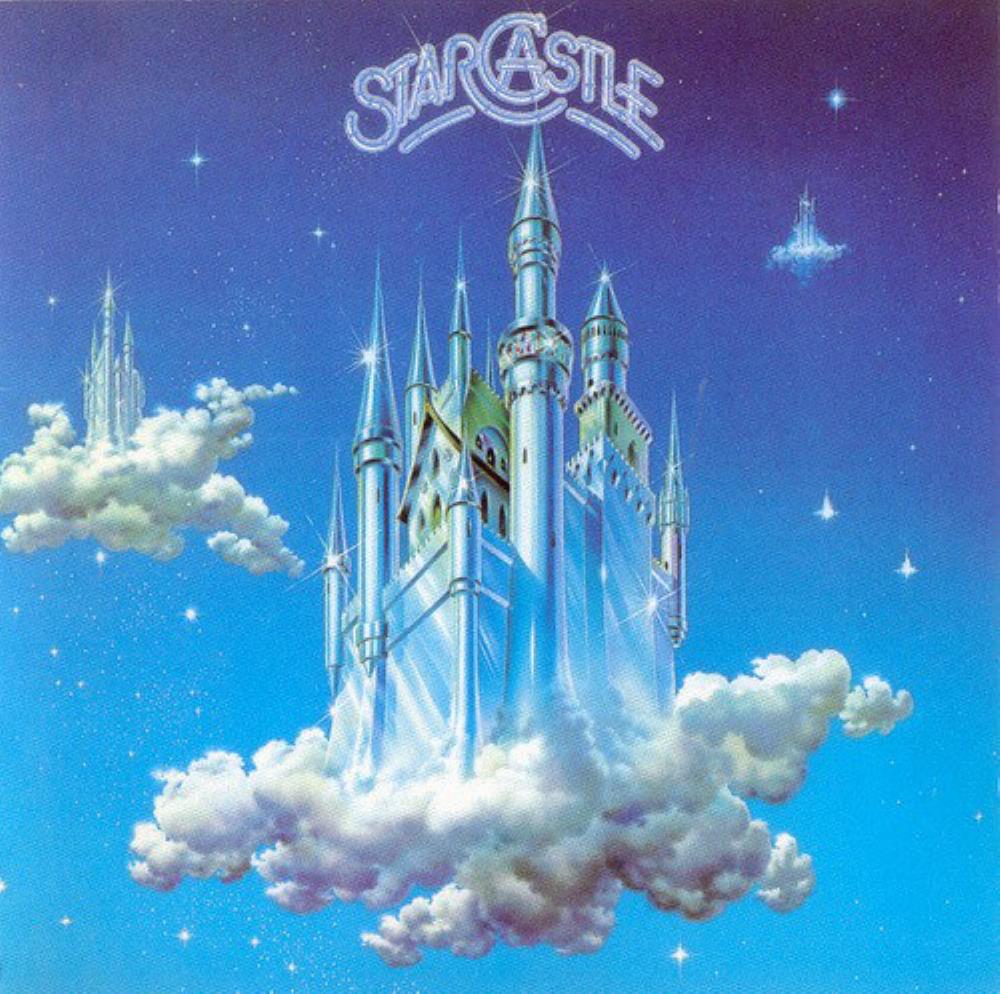
Styx (Chicago)
From the gritty working class neighborhoods of south Chicago, Styx is the epitome of the pop side of the Midwest progressive genre. I can see some of you bristling even using the words progressive and Styx together in the same sentence. They were always more ambitious than their talent – or songwriting – allowed for. But they also could be counted on to produce a few sincere progressive tracks in their early days like ‘Movement for the Common Man’, ‘A Day’ and ‘Suite Madame Blue’. It all came together on The Grand Illusion, where the band perfectly blended their pop side (‘Come Sail Away’), hard rock muscle (‘Miss America’) and progressive rock ambitions (‘Grand Illusion’ and especially ‘Castle Walls’). Like Kansas, 1978 saw a distinct turn towards more arena rock hits, which were expected by the record companies. And from there they continued down the slippery slope to pop irrelevance. Styx were huge in their home base, and as such, many local bands could only wish they were as known as the almighty Styx.
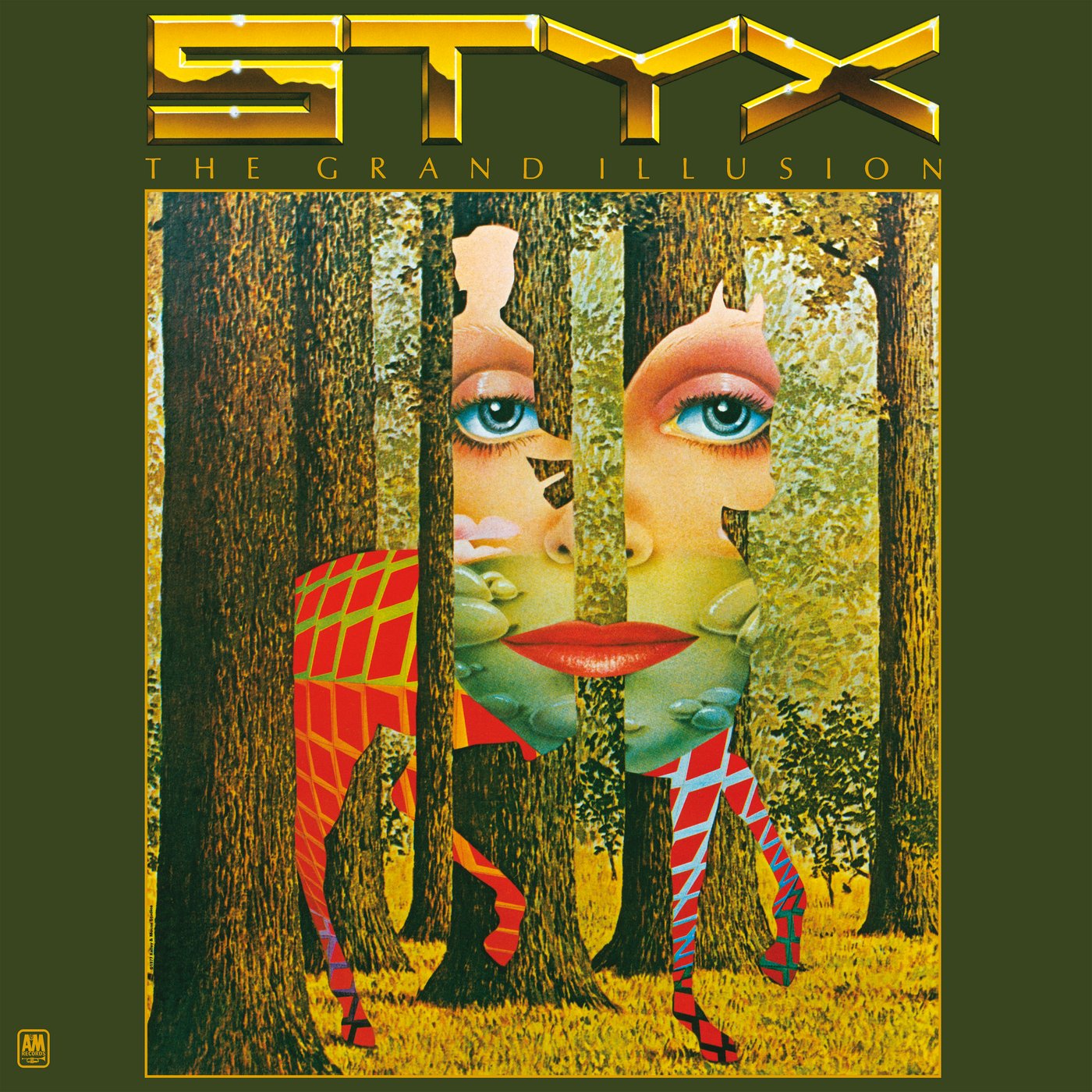
Zazu (Chicago)
On the same label as Styx (Wooden Nickel), another band that threw in that “one progressive track” to offset the more commercially tinged material.
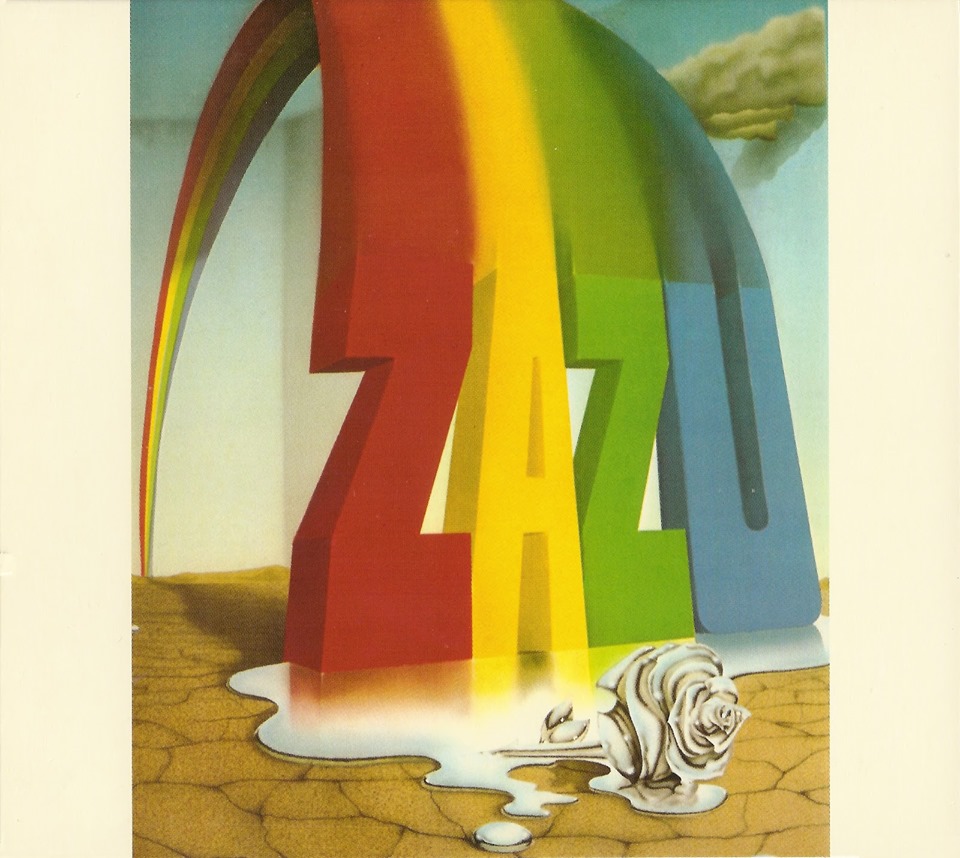
Indiana
Christian Friday
We cannot find out a thing about this 45. It was brought to us by a record dealer in Indiana, who used the awesome term of “ungoogleable” (the photos and music provided to us are all to his credit). The label turned up bupkis as well (honestly Energy Records has been used by 100s of labels).
When listening to these two tracks, it becomes apparent that this was likely recorded in the 1976 to 1978 time frame. ‘A Promising Glance’ (5:11 in length) could have been lifted right off Yezda Urfa’s Boris album. And there are references to the more progressive side of Ethos as well (think Relics here), especially considering the copious violin work. ‘Disco Rag’ is where the dates I’ve provided become more apparent. Like many bands of the late 70s, this song was a reaction to disco, rather than a celebration of it. Musically I would categorize this track as sophisticated hard rock.
Ethos (Ardour, 1976 | Relics, 2000) (Fort Wayne)
With an original album on a major label such as Capitol, some may find it strange that the only way to obtain Ethos’ classic debut Ardour on CD is via a Japanese press. But perhaps not so strange given the pathetic stance of the money hogging pop culture of the music business in America. 1976 was a different time and place for both American culture and business in general. So an album like Ethos could squeak in on a major label, make a decent profit, and everyone would go home happy. Today, I’m sure Ethos is held up at corporate meetings as a prime example of “Mistakes from the Past – How to Avoid them, a Seminar”.
Ft. Wayne’s Ethos were like many bands of the Midwest whose obsession with Yes, Genesis and Gentle Giant are well documented. These English progressive bands would enjoy regular airplay on the local underground, and very popular, FM stations played throughout the region. Concerts were met with great enthusiasm, and any kid that possessed a great talent for musicianship along with a hyperactive imagination, were quickly assembling together a band and making a go of it for themselves. Most ended up nowhere. Some procured a private release handed out at sparsely attended concerts by local union workers who were more interested in the booze and broads than the music itself. And then a few made the “big time”. In this scenario, Ethos were one that MADE IT. Today, they’re the kind of band that late middle aged guys whisper quietly about in a game of I-know-more-about-music-than-you-do. As in “I own an album I bet you haven’t heard, that’s way cool – a band called Ethos. Bet you haven’t heard of them!”. So basically popular enough to still be called out by over-aged dorks, yet too obscure for anyone at Corporate America to give a rat’s ass about. Pretty much sums up the American progressive rock scene of the 1970s doesn’t it?
Fort Wayne Indiana’s Ethos are one of the bellwether bands on this list. Of course this being an archival release – and it predates their major label debut – then you can probably expect more progressive and less commercial. And that’s exactly what you receive. Most of the material here is from 1974, with a couple of rougher demos going back to 1973.
For me, on reflection, it’s a bittersweet experience. On the one hand it is truly wonderful to hear such great treasure being mined from the vaults like this. On the other, one inherently knows that there should have been so much more. Countless bands operating in a similar territory, but not unified – disparate groups influenced by the same UK bands, though not learning from each other and pushing the boundaries as you would see in England, Germany, or Italy. Everything was grassroots. One of the primary themes of the Midwest Prog list is that America did not have a national scene like the various European countries did. Not a single enlightened record executive, nor a super wealthy individual stepped up and said “I got this”. Where were the patrons of the arts? Not everything has to have a bottom line, if one has the wealth to subsidize. I’m pretty sure those that bankrolled the magnificent church frescoes in Medieval times weren’t demanding an “ROI”. Sigh.
My buddy Mike put this CD out, and I bought it upon release. It’s a fine reissue, that comes with a poster insert filled with historical data.
Maelstrom (On the Gulf, 1973) (Indianapolis)
Fine progressive rock album from Indiana influenced by the usual UK suspects. Basically archival, though an original demo does exist.
The track listing provided here for the primary (P) release On the Gulf are from the Black Moon CD, since the last two songs were recorded live in 1980 and added as bonus tracks. I would bet the track ordering has been altered as well. Worth noting that there were only 5 demo pressings of the album, and only one is known to survive. This has been confirmed to me by the Black Moon label owner.
Be alert that the second album Paradigms is nothing like On the Gulf, and is geared more towards free jazz.
Mutha Goose (Mutha Goose, 1975)
I don’t know about this one honestly. I can’t find corroborating evidence that this is indeed from Indiana. There are a ton of entries saying it is, but it all seems to stem from Vernon Joynson’s book. The album was pressed in New York, and there’s some BS that it was pressed only in 50 copies on Discogs (which I’ve challenged). So it could be a case of propagating bad data, or the absolute gospel truth. Would like to know more though. Leaving here for now.
Typical Midwest prog, this time (purportedly) from Indiana. Recalls the southern Illinois group Thunderpussy in the compositions, though there’s a strong presence of keyboards here. One of the better US private progressive rock albums.
Raven (Terre Haute)
Classic progressive rock from Midwest America. This time from Terre Haute, Indiana, and features none other than the same drummer from the monster psych rock band Micah (1971) – who had relocated to upstate New York from Terre Haute a few years prior. So it takes a Portuguese vinyl only label to release this wonderful archival LP – OK, works for me. Global economy indeed.
This album (recorded 1976) has all the trademarks of a band from the era and region: Straightforward radio friendly tracks are offset by highly complex compositions and serious musical chops. And loads of that wonderful Hammond organ and Moog synthesizer! Perhaps not the greatest sounding recording, but certainly excellent given the circumstances. Other Indiana bands like Yezda Urfa, Ethos, and even Vindication will point the way if needing comparisons.
Overall a great find!
Stencil Forest (Opening Act, 1983) (Fort Wayne)
Small world time for me. One of the members of Stencil Forest is the older brother of a very good friend of mine who I met through my work in the software industry. When I first visited his brother (who had already relocated to Denver where we all lived), he stuck this album in my face and said “So you’re into obscure rock music – bet you haven’t heard of Stencil Forest?”. He was right – I hadn’t (this was back in 1995). They were from that unlikely hotbed of talent – Fort Wayne*, Indiana (Ethos, latter day Happy the Man). For those that are exceptionally perceptive, they did indeed get their name from the Happy The Man tune and apparently hung out with them quite a bit in the early 80’s. So fast forward to 2004. They just re-mastered the tapes and privately released their sole album on CD. It sounds absolutely fantastic! Very professionally done throughout. Musically this is Midwest pomp/AOR with a prog twist. Think Styx, Kansas, later period Starcastle, REO Speedwagon, Shooting Star, etc… Given the progressive leanings, probably the Canadian group Saga would be the most apt comparison. What’s most interesting is how creative some of the instrumental breaks can be. Not in a flashy chops way, but very much like a Happy The Man or Genesis in their prime would do. There’s also the cringe inducing choruses and obvious play for radio, but they really were shooting for the big time, as was everyone else in those days. Had this come out a couple of years earlier, they might have made it too. The only song on here that plays it straight throughout is ‘Looking Back’, one that can be skipped over quickly. The title track is a Cliff Notes version of what Stencil Forest are all about. You’ll be fumbling for the remote after hearing the starting sequence with its 1980’s AOR guitar chord rock and insipid chorus lines. Then, suddenly, the composition shifts to a complex and highly melodic mid-section. And back and forth it goes. This type of adventurism wasn’t found on most 1980’s arena rock albums. ‘Celestial Voices’, ‘Just a Fantasy’ and ‘Crossroads’ all have this yin / yang quality about them. ‘The Pandemonium Shadow Show’ is, not surprising with a title like that, the all-in progressive rock track that makes fans of the genre wish they’d just done a whole album of similar. It’s also the longest track clocking in near 9 minutes (again no surprise). The final two tracks, ‘Indian Summer’ and ‘Five Studded Poker Player’ are probably the best overall when considering the balance of melodic content and progressive interludes. In fact, the latter track would’ve been my surprise pick for a single, as it has the type of hook that lasts long after the album has ceased playing. Even the 1992 bonus cut ‘Five by Five’ is similar in construct. For vintage gear heads, it’s the Willy Wonka Chocolate Factory with Mellotron, Hammond B-3, Mini-Moog, and Hohner D-6 Clavinet. Stencil Forest are a six member group so a lot of ideas and synergy can be heard. I can really appreciate the time and place aspect of this kind of music. And this is one of the finest examples I’ve heard – especially for the genre’s late date.
*Some of the band members were from Elkhart, but they set up shop in Fort Wayne.
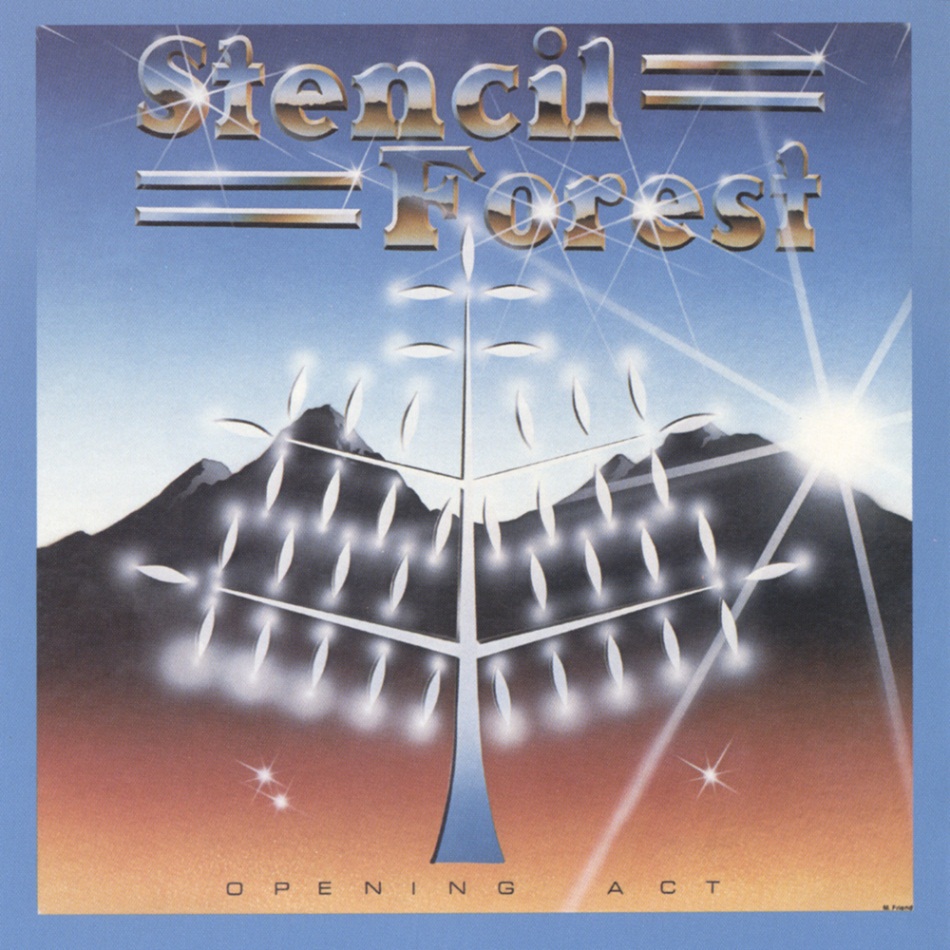
Vesuvius (Northwest Indiana; Chicago area suburbs)
Nothing released. However the keyboardist Joseph Shingler has posted 2 songs on YouTube (studio quality). Search for ‘Logic For a Lunatic’. And they are very good progressive rock compositions (4 stars at a minimum)! Is there more? It needs to be released! Shingler is perhaps more known for his contemporary band Ghosts of Pompeii.
Vindication (Vindication, 1973) (Columbus)
Vindication were a trio from Columbus, Indiana, who released only this one very obscure album. Once again we’re dealing with American teenagers still in high school, similar to Tom Nehls and Richie Duvall. And like both those gentlemen, they were the good kids in class, not rebellious types that are usually rewarded in musical circles. Turns out that the members of Vindication were also all hardcore prog heads, very much into Yes, Gentle Giant, ELP, and King Crimson. And like a lot of youth in the middle of the country, they were also very much into exploring their Christian faith. And this is reflective in the lyrics, but not in the music. This isn’t a lame progressive album so as to get the message out. No these kids really went for it, in the same manner as other Midwest bands of the era did such as Yezda Urfa, Xebec, and Graced Lightning. Perhaps not quite as accomplished as the great Yezda Urfa, but for certain they had talent to burn and some intriguing compositions. According to their bio, they recorded and released the album – in very limited quantities, which is most certainly true seeing how few have ever been spotted – between their junior and senior years of high school in 1974 (so the “accepted” date of 1973 seems to have been off by a year). Quite an accomplishment for 16 to 17 year old young men.
Unfortunately they let their faith get the best of them on the closing track ‘You and Me and God’, and it’s a typical youth group sing-a-long (similar to Michigan’s Earthen Vessel in that way). So skip over that (unless you happen to like Christian folk songs) and enjoy the rest!
Yezda Urfa (Portage (Chicago area))
There are few bands in the world that were more progressive oriented than Yezda Urfa. No matter, they still tried hard to achieve a major label signing. Fortunately they kept all their rejection letters, so we can all laugh today. You do have to feel bad for the AR guy at the record company who received the tape for Boris. He or she may have loved every minute of it, but there was NO WAY this band was getting signed up. Not in 1975 anyway. They did press a few copies of the album themselves – meant strictly as a demo, and hence the LP is super rare today. Sacred Baboon is an archival album recorded in 1976, but not released until the late 80s. If you came to this list looking for all-in progressive rock, then here you go.
From the Chicago area, Yezda Urfa represents the logical conclusion to where progressive rock was ultimately heading in its era. The trajectory in popular music from 1967 to 1975 was astounding by any measure. And yet it was just about that same time when the major corporations in music were looking to reign it all in. If you are looking for insanely complex, all-over-the-place, constantly shifting rock music, then Yezda Urfa is your nirvana. Not even in 1973 Italy do you find such insanity, and that was an organized scene where it seemed each band were trying to outdo each other. But, as it turns out, it was in northwest Indiana where the results came in, and Yezda Urfa ended up with the prize. Which is not the same thing as saying they were the best. No, they weren’t in my estimation. But they sure were great!
As stated, there were few bands in the world that were more progressive rock oriented than Yezda Urfa. No matter, they still tried hard to achieve a major label signing. Fortunately they kept all their rejection letters to share with us, so we can all have a laugh today. You do have to feel bad for the A&R person at the record company who received the tape for Boris. He or she may have loved every minute of it, but there was NO WAY this band was getting signed up! My favorite comes from London Records: “After listening to your material we have reservations as to its commercial potential…”. YA THINK?
The bonus track ‘The Basis of Dubenglazy While Dirk Does the Dance’, from the Syn-Phonic CD, is just as good as anything from the album proper!
History has a way of vindicating superior art such as this.
Iowa
Kansas (Topeka)
If there was a band that best represents the genre as a whole, it would have to be Kansas. They were progressive and they were commercial. They borrowed heavily from the UK progressive rock scene, and yet they had their Midwestern roots stamped all over their sound. And their music was radio friendly. Song For America perhaps should have been called Album of America. Make no mistake, I’m no Kansas fanboy (though I do admit to loving their first 4 albums), and I’m by no means suggesting Kansas is the be all and end all. Just that we’re at ground zero here. Point of Know Return is aptly named, as that was the album that truly broke out the group worldwide, and yet they went off the “pop cliff” with it. Of course, it was 1977, and radio friendly anthems were now expected. For many, Kansas is a caricature of all that was wrong with the 1970s. For others they were the epitome of the can-do American spirit. No matter your feelings about the band, they were no doubt looked up to by countless others within the region. Many aspired to be the next Kansas. They were huge in their day, and their 1970s material is still played on classic rock radio on a daily basis.

Proto-Kaw (Lawrence)
I suppose if the primary band of the entire list is Kansas, I should give consideration to the original formation known as Proto-Kaw. Now my comments here only apply to the 1972-73 recordings, not the 2000 era reformation band. What’s interesting about the early incarnation of Proto-Kaw is that they were one of the few US bands to embrace the underground progressive scene in England at that time. I don’t mean the bands that made it big here like Yes, ELP, and Genesis, but rather the more obscure bands toiling away on the Transatlantic, Neon, and Dawn labels. Perhaps only Boston’s Guns and Butter were more UK focused than Proto-Kaw. Not sure they’re a good fit for the list, but felt I couldn’t leave them off either. And a great posthumous album too!
Sanctuary (Sanctuary, 1971) (Lawrence)
I wasn’t quite sure where to put Sanctuary. I even thought about leaving them off. In reality they are the prototype for the bands listed here. They also embraced Yes, but at the time of Time and a Word not Fragile or Relayer. And CSN&Y were an influence too. And yet they are balancing the pop sounds of their day with the progressive of their day. So being from 1971, they are the oldest band to be featured here.
Kansas based progressive rock group, with remnants of psych, somewhat typical of the US rock scene of 1971. They take the unusual course of covering Yes ‘Time and a Word’, plus an Edgar Winter Group composition stretched to 20 minutes. Some folky bits and lots of mellotron for fans of the style. One gets the impression they’re a Polyphony type group (though Polyphony’s album is far better than Sanctuary), where the best material still sits in a vault somewhere, just dying for an ambitious US reissue label to release them.
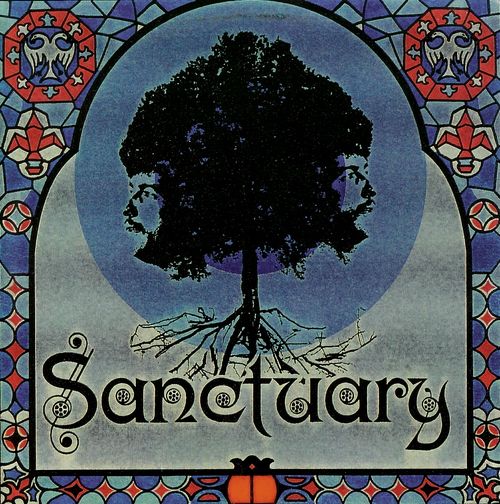
Kentucky (Northern)
Easter Island (Easter Island, 1979) (Louisville)
Oh wow, this album needs a lot more love. Bump city. Easter Island is practically the definition of the USA Midwest / Ontario Progressive Rock (1970’s/early 80s) list. I do think subjugating oneself into the mindset of the era does enhance the experience. Tons of time changes, counterpoint, multiple harmony layers, mellotron, 70’s analog production, and sundry razzle-dazzle will keep the most ADD among you tuned in. Funny to read the term “commercial” in reference to this album. Hardly. Unless one thinks ‘Gates of Delirium’, Mirthrandir, Cathedral, or Yezda Urfa are commercial of course…
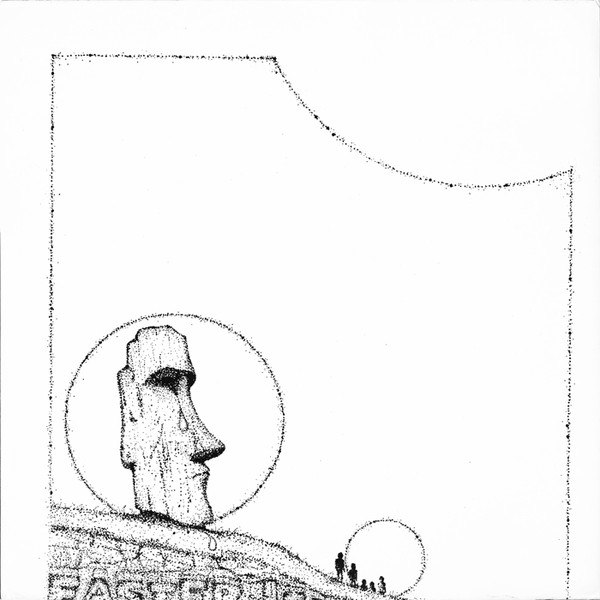
Pre (Louisville)
Pre was an extraordinary discovery from Steve Roberts at ZNR. Since he was based in Kentucky (and an original member of French TV), he was responsible for the reissue of The Bluegrass State’s most famous progressive rock group: Easter Island. Through that connection, ZNR was hooked up to a band that had a fully realized album in the can – one that had remained unreleased for near 20 years. A group with the simple name of Pre. I don’t think it’s an exaggeration to say that Pre’s sole album is the single greatest American progressive rock archival find from the first part of the 1970s (remember that other excellent archival finds such as Pentwater and Yezda Urfa were from the latter half of the decade).
The CD today is pretty much extinct, but most of my running set bought one immediately upon release. It’s been a good 15 years since I last heard it, and it was peacefully resting deep in the collection. After hearing it again recently, the album still satisfies on so many levels.
The album starts off in a dubious manner with a soft acoustic instrumental followed by a spurned love ballad, that’s rather annoying. Not exactly orthodox opening moves from the progressive rock handbook. But things get very interesting quickly with ‘Water Meeting’ and it becomes very clear why we’re listening to this album in the first place. It never lets up from there. It’s also very clear just exactly who is the influence behind the band. The simple 3 letters of Pre matches their idols. It is the music of classic Yes especially The Yes Album and Fragile. But a little more compact and urgent, common traits of a restless American society. What’s most extraordinary about the music of Pre is the recording date of 1973. The American landscape is littered with bands that copied the almighty Yes, but most of them surfaced in 1975 or later. Pre was clearly ahead of the pack. For the first half of the 1970’s, perhaps only Polyphony could be considered more “progressive” from the States. All the trademarks are here: Heavy organ, loud woody bass, great guitar leads, complex rhythms, passionate vocals. Best tracks are, not surprisingly, the longest: ‘Ascetic Eros’ and ‘Ballet for a Blind Man’.
What’s also great about Pre’s album is the quality of the recording. It sounds like it was recorded in a major label studio with a large budget. This is not the typical low budget, 3rd generation drop-out quality we’ve come to expect.
One collector note: The cover you see above is actually a two piece kit. The gold border and “Pre” lettering is actually a thin plastic film that is inserted into the jewel case and provides a frame around the cover art. An interesting idea, and practical – if you break the jewel case, the film can be transported to another one.
It was 20 years between the time of this recording and its first release. And that was 20 years ago. Wow. Don’t miss this title if you see it.
Michigan
Guardian (Detroit)
Adding this one something on faith. Guardian was the next band that Victor Peraino was in after the Kingdom Come album we’ve listed here. I’ve been told they were progressive as well. The only recording that exists is a 4 minute clip from a 1977 comp from Detroit called W4 Homegrown, which also features Northwind interestingly enough. I haven’t heard it myself but I’m guessing the 4 minute track wouldn’t necessarily be representative in any case.
Inserts (Out of the Box, 1983) (Ann Arbor)
A very interesting instrumental album from Ann Arbor, Michigan. Inserts are an improvisational guitar based trio, with a clear understanding of the value of a good production. The guitar is distinctly from the Fripp school, including the angry atonal fuzz tone. The bass work has an almost Zeuhl quality about it, though it doesn’t rumble along the rhythm like Paganotti or Top would do. These kind of albums didn’t typically exist in 1983, but other than the occasional Starless and Bible Black reference, I would say that the Inserts were ahead of their time. You could convince me a band such as Djam Karet may have stumbled onto their album in a used bin somewhere. Album was pressed in Japan and released on their own label here in America. It’s a first class job all the way. They have a second album Illusions of Rule from 1986.
MacArthur (MacArthur, 1979 | II, 1982) (Saginaw)
Namesake band leader and guitarist Ben MacArthur states in his liner notes to the newly reissued CD on Out-Sider: “In 1977…the Rust Belt was in full decline and jobs were getting scarce. There wasn’t much to do, so we picked up guitars and wrote songs and recorded albums, because we loved music. Because we believed we could be something more than even rock stars. We believed out music would survive the ages.” OK, now go read my introduction to the USA Midwest / Ontario Progressive Rock (1970’s/early 80s) list. I’m telling you folks, this was the phenomenon of the time and place. There were no video games to distract, and no gainful employment to be had. Perfect then, let’s create a band!
Further, Ben adds “I went to watch Bill (Heffelfinger, keyboardist, guitarist and engineer of MacArthur) play with a band named Labyrinth at a local fair, and they played 2112 by Rush and I was truly amazed!” And there it is again, a local regional hero providing the guidance, in this case Toronto’s Rush.
And really, that’s all you need to know about the debut of MacArthur. Rush is definitely the blueprint, but traces of other UK and US prog and hard rock bands are apparent. It’s definitely an original work, despite the influences. Overall it’s a very primitive, but earnest effort, by quality musicians and composers, looking to make their mark on history. Generally, this was the type of album that would be captured by the “cassette tape culture”, that was just about to get rolling in the early 80s. By pure happenstance, the band was successful in getting 200 LP’s pressed by the custom label RPC in New Jersey (hence the band was often wrongly referred to being from there, rather than Saginaw, Michigan). So yes, it does require a mind shift and a predilection for such artifacts. And I clearly do, so my rating is biased accordingly. Bumping to current date to create awareness of the new CD.
Hopefully MacArthur II won’t be far behind on the reissue front, and it’s definitely a more professional recording.
Oh… and yes, as Thrasher notes, the album is from 1979.
MacArthur II is clearly a followup to MacArthur’s debut. Recorded between 1977 and 1982, the music on II is remarkably similar, and not a surprise given the time frame. Except II is even better, thought out, and more mature. By 1982, this kind of music here in America was extinct, so it’s always fun to see an album like MacArthur II appear on the landscape. Primo-era late 70s Rush remains the primary influence, though there’s a distinct space rock jam element this time, which is even more unusual for the time.

Northwind (Distant Shores, 1982) (Detroit)
Northwind were a Detroit area progressive rock band that is another fantastic representation of the Midwest music scene of the era. Hints of commercialism abound, but the group cannot resist the tricky compositions, while wailing on all that fat analog gear. Bands like Surprise, Starcastle, Ethos and Albatross are all good reference points. These albums are available for free on the band’s website, but I for one would love to see a full blown CD production with liner notes, photos and a more detailed history. Distant Shores (recorded in 1977), the stronger of the two albums, was never formally released, and the debut only existed as a white cover demo, that bootleggers later renamed The Woods of Zandor.
Victor Peraino’s Kingdom Come (No Man’s Land, 1975) (Detroit)
One of the rarest of the US 70’s progressive albums, Peraino’s sole work is a direct result of his former keyboard work with Arthur Brown. So he brought the UK experience with him. One of the few albums from America where one can hear a distinct Italian influence (Osanna).
Despite being originally associated with Arthur Brown’s Kingdom Come as their flamboyant keyboardist, Victor Peraino is a denizen of Detroit, and his sole LP length album is clearly a product of the 1970’s US Midwest. That is to say, a mix of radio friendly AOR music, and all out progressive rock compositions. The difference between the relatively simple ‘Demon of Love’ (2:30) and the ultra complex ‘Empires of Steel’ (8:25) back-to-back is jarring to say the least. At once Peraino puts together a radio friendly anthem and then follows with a mellotron fueled hyper-complex progressive piece with fluttering flute and psychedelic guitar solos, right out of Osanna’s ‘Palepoli’ songbook. This is followed by the trippy ‘Tru’ (2:15), an Eastern mystic mellotron piece that no doubt could have been found on a Timothy Leary inspired Kosmische Kourier album. And I suppose it’s no surprise that Leary was considered a guru by Peraino himself. Perhaps ‘Lady of the Morning’ (6:10) is a concise example of the entire USA Midwest progressive movement. The songcraft and choruses are all radio friendly, but the instrumentation (some amazing mellotron, guitar, flute sequences here folks) and progressions point to a more arty pretension. This album could have only come out in the mid 1970’s and from a place like Michigan. Really. Nowhere else. It’s critical to understand the background of an album like this to truly appreciate it.
This album languished in the bootleg market forever (originals are off the charts rare), until the Black Widow CD (2010) finally surfaced with permission (and liner notes) from Peraino himself.
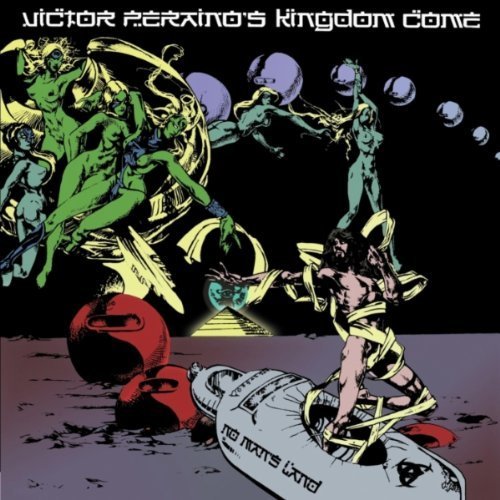
October (October, 1979 | After the Fall, 1979) (Detroit)
October are a Detroit, Michigan area based progressive band. Their sound is a unique combination of symphonic prog rock with a pronounced fusion flair, probably due to the abundance of electric violin. The vocals have that late 1970s “private press voice” that is found on many albums from America during this time. Strangely, the vocals remind me a bit of the guy from Babylon, though not quite as Gabriel-esque.
After the Fall is more symphonic rock oriented than the debut, and a bit looser in structure. Long passages are reserved for jamming and other instrumental experiments. This album remains as probably the single rarest US progressive rock album, with supposedly only 25 pressed, each with a hand painted watercolor cover. I can honestly say that in all the years I’ve been collecting, I’ve never seen one actually for sale. A good friend of mine paid dearly for one, and it’s a site to behold.
Quorum (‘April’s Song’ / ‘Dream a Dream’, 1975?)
Oh, how do I wish to hear a whole album by these guys (archival tapes anyone?). From Michigan, they completely fit my ideal for list. There are only 2 short tracks on this 45, and yet in these moments we hear the defining characteristics of the region and era: Commercial and FM ready, yet complex and very much progressive in its execution. We can dream I suppose…
I’ve been told this single is from 1975, though there is no corroborating data.
Xebec (‘Seventy Five’ / ‘Dissonet’, 1975) (Grand Rapids)
To me, on first glance, it looks like the name of an Aztec god… or something. So what is a Xebec anyway? A Mediterranean sailing ship used for trading in the 1700s. Well isn’t that exciting. Guessing then, using the age-old trick of looking for a band name in the trusty Webster’s, this one stood out.
OK, then, what was I talking about? Yes, a band named Xebec. This particular group with the sailing ship moniker was from the western Michigan town of Grand Rapids, and who managed to eek out this one obscure 45 before completely falling off the face of the Earth – and remains undiscovered as we speak. Tragedy that. Because this is – stop me if you’ve heard this before from moi – a bullseye for the Midwest progressive rock sound of the 1970s. Just down the road from these guys were three Chicago bands: Yezda Urfa, Pentwater, and Graced Lightning. If you’re familiar with any of those, then you know what to expect here. This falls on the complex side of the genre. Awesome.
The single itself features a near 4 minute instrumental (‘Dissonet’) as well as a 7 minute cover of Touch’s pioneering ‘Seventy Five’, which would have been an enlightened choice in 1975, long before that album enjoyed a renaissance. If that’s all I heard, I wouldn’t have launched into the prelude as I did. However, I was also a sent a full live recording that shows the band stretching out. The original material is fantastic, as well as the covers – which include Yes, Genesis, and Gentle Giant. So yea, these guys were hardcore progheads even back then. The recording itself has many dropouts, but still worthy of a greater audience.
Hopefully Xebec is sitting on a full canister of unreleased studio and live tapes. This one is begging for an archival release.
Minnesota
Fairchild (Fairchild, 1978) (Minneapolis)
Minneapolis based AOR styled progressive rock band. Strong overtones to the top acts of the era like Kansas, Boston, Journey and Styx – especially the latter. Though the album is private, it looks and sounds like a major label effort.
Terry Masters (Thesaurus, ?) (Minneapolis)
We have quite the discovery to share today! It’s been a long time, going back to the CDRWL days, that we had something this much fun to share. This one was discovered the old fashioned way – me taking a chance by buying the vinyl. Score!
So who is Terry Masters anyway? Well if you start digging around the ole’ World Wide Web, you’ll discover that he had one 45 released under the avoid-at-all-costs name of Terry Masters at the Organ. You can hear one of the 3 tracks on YouTube (not bad really, guessing a 1970 provenance). Beyond that, what you’ll find is Masters was basically a nightclub crooner. You can see and hear live clips on YouTube from 1983 of him sitting at the keyboards and singing Hall & Oates, Bob Seger, that sort of thing. Apparently he was playing Vegas shows, as well as performing lounge music in his native Minneapolis. This ties in with the narrative we then read on the back of this private press (which shows a forlorn Masters in a toga made from what looks like an old bathrobe): “Many people ask Terry to do the music he really enjoys, but limited to dance music on the job, he is not always able to play from the heart. Now, accompanied by John Calder on the drums, Terry creates the music everyone has requested and shows his great versatility on the organ, bass and mellotron. We hope this completely instrumental and spontaneous album will give you a new insight into the “other side” of Terry Masters.”
Ummm… something tells me this isn’t what his fan base had in mind. When I purchased the LP, the seller fortunately photo’d the back cover so I could read the above quote. Without that I would not have taken the chance. An instrumental album with mellotron can’t be that bad I figured. I actually thought this was going to be an electronic rock album with drums, similar to perhaps Klaus Schulze on Moondawn, but without synthesizers and more organ. Nope. It’s an instrumental prog rock album all the way! Just two side long excursions titled rather predictably ‘Thesaurus I’ and ‘Thesaurus II’. The music is very free form, loose in structure, but not noisy or avant-garde in the slightest. It’s very engaging I must say. And it is absolutely slathered in mellotron. I don’t think it’s an exaggeration to say this album has more mellotron than any 1970s era album discovered in the last 20 years. The album really has no obvious comparisons. Of course one could pull out ELP as a desperate attempt, but that’s really scratching the surface. Probably the closest comparison I can come up with is Siloah on Sukram Gurk, but more professional sounding than that would imply. Perhaps also The Trip at the time of Caronte, if one considers the instrumental work, and replaces guitar for mellotron. John Calder is going nuts on the drum kit, playing in an almost jazzy manner, but clearly on amphetamines. Calder incidentally was the drummer for none other than Podipto, a relatively well known country rock band from northern Minnesota who had one major label release in 1970.
Finding info about this album is nigh impossible, though there have been a handful of sales on ebay, as archived by Popsike. Mostly not expensive either. One dealer called it “folk psych”, clearly they did not take the time to hear the album, as it is of course, neither. Other auctions call it a “synth” album. None of those either (though some people do erroneously call a mellotron a “synth”).
An album truly out of nowhere. Not brilliant or the greatest lost album of our time, but certainly excellent on the whole. If for nothing else, worth hearing for its unique sound crafted inside a more familiar terrain. Sadly, Terry Masters passed away in the summer of 2018. Hopefully he got to tell his story to someone, or wrote it down somewhere. I certainly would like to know more.

The Sailor Band (Sailor, 1974) (Minneapolis)
Sailor were a band from Minneapolis who released this one obscure progressive rock album, that is even unknown among collectors of the genre. Sometimes you’ll see the band listed as The Sailor Band, due to a few copies having a stamp (like the one pictured here). A surprisingly sophisticated sound for the time and place. Most albums from 1974 – in the US at least – have a pronounced hard rock element, and there’s little of that here given the strong overtones of jazz and classical. There’s plenty of jazz guitar and piano, in addition to the amp’d up electric guitar and Hammond organ. The album is almost entirely instrumental except the final track. A nice surprise.
This Oneness (Surprize, 1975) (Minneapolis)
Minnesota based group who performs a Mahavishnu styled heavy fusion with Canterbury touches. The song portions are of the Midwest progressive rock variety ala Ethos and Albatross. The odd song out is ‘Please the Sunshine’, an almost-gospel like vocal track that is a bit painful to endure. Overall an excellent fusion album.
Missouri
Morningstar (Kansas City)
Definitely on the AOR side of the house, with a sound close to Styx and the poppier Kansas material. Definitely fits the prototype though. They were even signed to a major, but I can honestly say I don’t remember ever seeing these albums even back then.
Realm (Kansas City)
Lightweight Yes style, that could use a power boost. Not a great album, but a good fit for the list.
Shooting Star (Kansas City)
Marginal inclusion, because in reality, Shooting Star were a pop band through and through. They flirted with progressive rock on their debut album, and as such, were within the union of the Midwest progressive sound. They were signed to Virgin, and they actually had a pretty decent career throughout the 80s, though never achieving stardom. Oddly enough, their one overt progressive track ‘Last Chance’ is the song that received the most airplay back then. It’s a Kansas copy, complete with ripping violin solos – and why not? Kansas was huge, and they were practically neighbors! Only album representative: Shooting Star.
Skyeros (Skyeros, 1975)
Skyeros reminds me a lot of another band called Luna Sea. Both are from the Midwest, and pretty much play in a straightforward rock style with a rural tinge. But whereas Luna Sea dedicated all of Side 2 to their more progressive ambitions, Skyeros waited until the final lengthy track, and even at that, it’s marginally progressive. A few changes here and there, but it’s pretty conservative. Some nice organ and guitar work can be found on this track. Doesn’t really fit the “Midwest progressive” sound that we feature quite a bit here. This one is more rock / AOR oriented. It’s a very rare and sought after album, so worth a daily entry for that at least. Skyeros are from the St. Louis area and the album was recorded at Golden Voice Studios, which is in Pekin, Illinois (near Peoria). The studio is not a stranger to fans of the Midwest progressive crowd, as its where Pentwater, Starcastle (first album) and Styx (Man of Miracles) laid down their recordings. St. Louis based rock group Head East also recorded there.

Surprise (Assault on Merryland, 1977) (St. Louis)
Surprise are perhaps the ultimate example of the small time Midwest progressive rock band. They were clearly hoping for a radio contract, but their ideas were also based in the UK progressive rock scene. If I were to pick one album from this list to represent the genre as a whole – it would be Assault on Merryland. That’s not to say it’s the best album, just the most representative.
In the game that was the US Midwest underground progressive rock scene of the 1970s, Starcastle emerged as the winner (commercially speaking and not counting Styx, Kansas, etc… Keyword: Underground). There were plenty of other worthy competitors for the title (Ethos, Albatross, Pentwater, This Oneness, etc…). Surprise, from St. Louis, were one of the better ones to have participated. The genre itself can be defined as a mix of complex rock with a clear understanding of radio friendly chart music, as FM radio ruled the thoughts of the day. There’s a common DNA amongst all these groups, and can be instantly recognized if your ears are tuned to it. Four piece group where everyone plays a multitude of instruments to add plenty of variety.
Topper (At Last, 1977) (Kansas City)
As stated in many places, I truly enjoy the underground rock scene of the great American Midwest and Topper are no different. This time hailing from Kansas City, we have a band that was typically over ambitious, and wonderfully amateurish. The Moog soloing in particular is inspired. There are a lot of ideas on their one album, and it’s clear they had a few Uriah Heep, Nektar, Yes, and Led Zeppelin albums in their closet. Basically a mix of hard rock, progressive, and a little bit of FM/AOR too. And they get a little too close to plagiarism in a couple of places (‘Smile for the Clown’ rips straight from ‘Stairway to Heaven’ incredibly. Guys, surely you were aware everyone knew this song already. Right?).
Nebraska
Luna Sea (Luna Sea, 1976) (Blair, north of Omaha)
Well, this really is lunacy. About as dramatic a difference in A-side, B-side as the Eik – Speglun album.
This is a newly discovered rarity out of Nebraska, that’s just starting to make the rounds. Interesting to note that Queen used the exact painting on their 1991 “Innuendo” album, except in color (thanks Waxidermy for that info!).
This is another rarity sent in from The Alaskan Connection. I thought he did a magnificent job at describing the album, so take it away AC:
“It’s the lone private press LP by an almost totally unknown US band named Luna Sea. They were from Blair, Nebraska of all places, but the album was recorded in Iowa. The first side is going to really test your willpower, as it’s just straight radio-rock a la the Eagles, so you’ll just have to “man-up” and slog through it. There is a pot of gold at the end of the rainbow, though, because side 2 is totally different. Suddenly the synths appear, and things start getting a lot more interesting. It starts out in a still fairly accessible style, but things get proggier literally by the minute, until the last track “Rousing The Ghost”, which is a fantastic piece of instrumental symphonic prog with great guitar, keys, and even a little flute. Oh, and be sure to stay tuned for the unlisted (and totally stupid) outro! A completely schizophrenic album, but even the band seemed to know this as they named the first side the “Light Side” and the second side the “Dark Side”! Hard to tell what they were really trying to accomplish here. But, such is the nature of the US underground. One part confusion and one part inspiration. I guess that’s kind of the charm! In any case, this thing is seriously rare. It only first emerged onto the collector scene within the last year or two, and since it was first discovered only like two or three copies have popped up.” Thanks AC!
So true on the question “what are they trying to do here?”. It was very typical for bands in the 1970’s to try for a radio hit while mixing in their progressive rock ambitions. That strategy never did work.
One of those bands you just hope has more on tape somewhere, to make for a truly great album. The last track is brilliant but Side 1 is indeed dreadful…
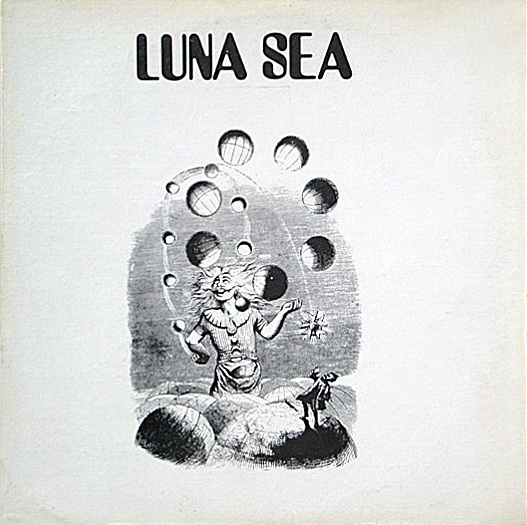
Ohio
Apocalypse (Cincinnati)
All we have is a 4 minute clip from a local radio station comp of unsigned bands called WEBN – The Vinyl Days. Fortunately it’s been posted on the web, and it’s quite good. Fits this list perfectly, perhaps even a very late era psych aura pervades. Hopefully more material exists somewhere!
Atlantis Philharmonic (Atlantis Philharmonic, 1974) (Cleveland)
Atlantis Philharmonic is a duo formed in the Cleveland area. Despite the small lineup, it sounds like a much larger ensemble with a full array of keyboards (primarily organ), guitar, bass, drums, and quite a bit of percussion. The album contains a mix of instrumental and vocal work, and even veers towards the commercial in a couple of places. In this way, Atlantis Philharmonic is clearly a product of the Midwest progressive rock scene. Its heritage is obvious on repeated listens. A long time favorite album of mine.
Intra (Cleveland)
Another excellent archival discovery from the good folks of Shroom. This is yet another classic progressive rock album from the Midwest USA – this time Cleveland. The UK group Yes once again plays a major role in the overall sound, though snippets of other progressive rock groups enter here and there. A bit more complex, and less radio friendly than some of their peers. Hence they never found anyone to release their material in the first place! Definitely a product of the region it comes from.
The below matrix represents the recording dates:
Tracks 1-5. 1976
6-7. 1984
8-9. 1990
9-11. 1980 live
Perhaps most remarkable is the consistency of the music quality across the 15 year duration.
The Load (Praise the Load, 1976) (Columbus)
A surprisingly lightweight progressive album, given that the region is known for adding some muscle. Classically influenced, and definitely influenced by ELP and The Nice. The regional influences are apparent in the commercially oriented songwriting.
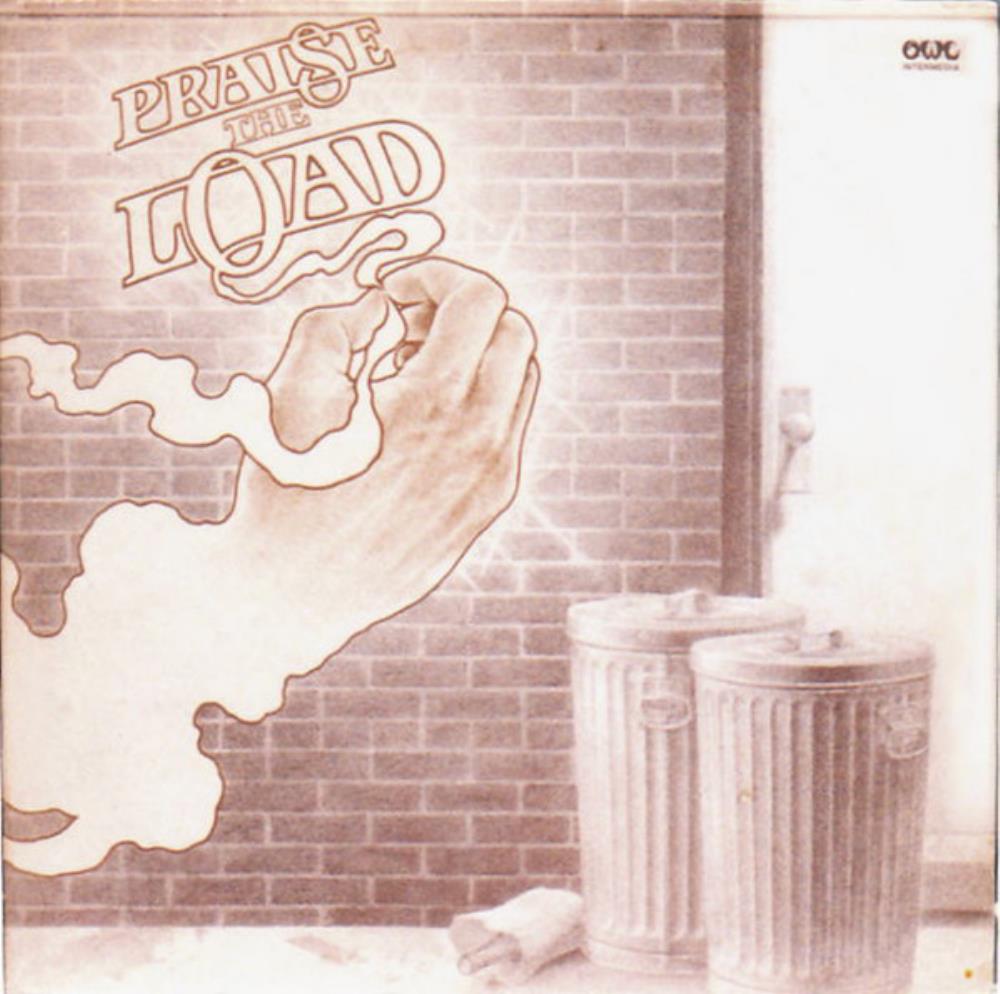
Quimm (Chilicothe)
Nothing can be found about this band. The label is from Chilicothe (southern Ohio about equidistant from Columbus and Cincinnati). They have one single from 1973 titled ‘Rock God’ / ‘Indian Woman’. I’ve only heard the former and it sounds a lot like Uriah Heep to me. Excellent organ too.
St. Elmo’s Fire (Cleveland)
Live at the Cleveland Agora is St. Elmo’s debut album from this fine progressive rock band from the namesake city. It would be their only album during their original tenure. Released privately, it was a 4 song instrumental EP that demonstrated a band with immense talent, captured live. Because of this, the sound quality isn’t the best, and you get the feeling the band still needed a bit more time to work out the compositions. Since it’s instrumental – but not a jam record – then melody and structure will need to carry the load. There are times here when one expects a vocal passage, or perhaps another theme break. It doesn’t help that the tracks are fairly longish. Musically it’s influenced by the usual UK suspects, just as every other progressive rock band from the Midwest were. St. Elmo’s Fire incorporated a bit more King Crimson than usual, and one can also trace a bit of late 70s Rush in the grooves. Overall, Live at the Cleveland Agora is a fine EP, and worth seeking out on its own.
The band were to reform some 18 years later in Iowa (at least administratively), and rather than reissue the EP alone, they added the full concert plus 3 more tracks taken from two other shows in 1980. They also rechristened the album Splitting Ions in the Ether and added new artwork. The 9 tracks on display here are similar to the EP, but elongated even further since the 2 tracks left off were also the lengthiest. The odd thing about these two is they sound better than the 4 tracks from the EP, which have remained somewhat distorted even into the digital age. The other 3 songs are musically similar and ‘Gone to Ground in the Khyber Pass’ (left off from the EP) might be their best composition on here. Definitely the CD is the way to go if looking for ownership.
St. Elmo’s Fire persevered for one more album, Artifacts of Passion, that is arguably an improvement over their original effort.
Tomsix (Cleveland)
When I created the USA Midwest / Ontario Progressive Rock (1970’s/early 80s) list, one of my secret hopes was that I would receive recommendations for something similar. I knew I would get suggestions of albums that were on the fringe – or worse just anything that was from the Midwest (and I did of course). But if someone could offer a complete bullseye for the style – a band or album I’d never heard of – well, then, my list would be a complete success. The very first suggestion came in from Tony Coulter (Heratius), and it was Tomsix. An absolute diamond in the rough if there ever was one. An album that’s been out almost 20 years and still a complete unknown. I received a great many suggestions afterward – primarily from Tony and our good friend Mark MoeCurly – but Cleveland based Tomsix was the winner of the litter for certain. This archival disc covers the band’s activities from 1974 through 1979.
Not surprisingly, the earlier you go in the timeline, the more progressive the music becomes. The 1974-75 period is when the band was known as Tarsier (which is arguably a much cooler name than Tomsix, which incidentally was named for the Tomsick trio of brothers that run the band). This era of material is heavily influenced by Yes (a common occurrence in Midwest America) with a smattering of Gentle Giant – and there’s gobs of mellotron for fellow fans of the instrument. Starting in 1976, the band switched names to Missing Persons (no relation to Mr. & Ms. Bozzio we presume), and directed their sound even more to the counterpoint rhythms and harmonies commonly found in Gentle Giant. The music is tight, slightly commercial, but still very complex. The absolute definition of the Midwest American progressive sound. Though the liner notes aren’t clear about this, it appears the band then went with Tomsix starting in 1978. Not surprisingly, this era of the band finds them at their most commercial, with even a slight funk/disco sound creeping in. I would say at this point, the band sounds most like Supertramp, but more progressive than that may imply. Tomsix never did properly record an album (such a shame too, as the quality of the sound on this compilation is very good). The material is not presented strictly from a chronological perspective, though the progressive tracks are front loaded (demonstrating to me at least, that’s where the heart of the band lies). This CD, perhaps remarkably, can still be found at CD Baby as a factory pressed disc. Don’t wait too long, as I’m sure this is a title that once it’s gone – it will stay gone.
Triac (Cleveland)
Yet another band that has no provenance on the internet. A detailed search finds that this private pressing comes from Cleveland. It’s catalog number and placement in that catalog indicates this to be a Christian band. Certainly the track titles indicate such. The one 45 I’ve heard is ‘In Search Of’ / ‘Message’. The A side is somewhat typical lightweight psych rock, but the flip is killer. With loud acid guitar, bass, synthesizer, and a few theme changes. Definitely would like to know more here.
Pennsylvania (Western)
Arabesque (Pittsburgh)
An amazing find from the music archivists at Shroom. Arabesque were a Pittsburgh area progressive rock band, and these recordings date from 1976-1979. All you have to do is look at the track titles on your right and the associated timings, to know these guys fit squarely within the 1970s over-the-top ultra complex Midwest US progressive aesthetic. Pentwater’s Out of the Abyss would be a good benchmark, though the recordings here aren’t quite ready for prime time. One can only imagine how amazing this would have been with the proper studio time. In fact, in overall sound, complexity and mindset, I was mostly reminded of Skryvania from France. If all this sounds good to you, then Arabesque is a must pick up. I usually have little tolerance for less-than-ideal recording standards, but this one is an easy exception.
South Dakota
Asia (Rapid City)
Western South Dakota is much closer in spirit to Wyoming and Colorado than it is the Midwest, but technically it’s within the geography – and musically, like the Luna Sea album, it’s pretty much its own thing – but with ties to the Midwest. Good mix of AOR/hard rock and some progressive. This band had a penchant for writing good songs.
White Wing (White Wing, 1976) (Rapid City)
I recently got back into the Asia (Rapid City, South Dakota) albums that were diligently reissued on CD by Michael Piper / The Wild Places back in 1995. While reading the liners, I had forgotten that the precursor to that band was White Wing, an album I heard way back when and completely forgot about (didn’t even have it rated anywhere).
There’s nothing really special about White Wing. It’s pretty much a mix of hard rock and AOR styles with some good organ runs and mellotron strings. Recorded in the same studio (ASI) as the Minnesota group Cain, and there are some similarities regarding the hard rock aspects. Not at the same level as the successor band Asia, especially Armed to the Teeth, but an album worth hearing a couple of times for certain.
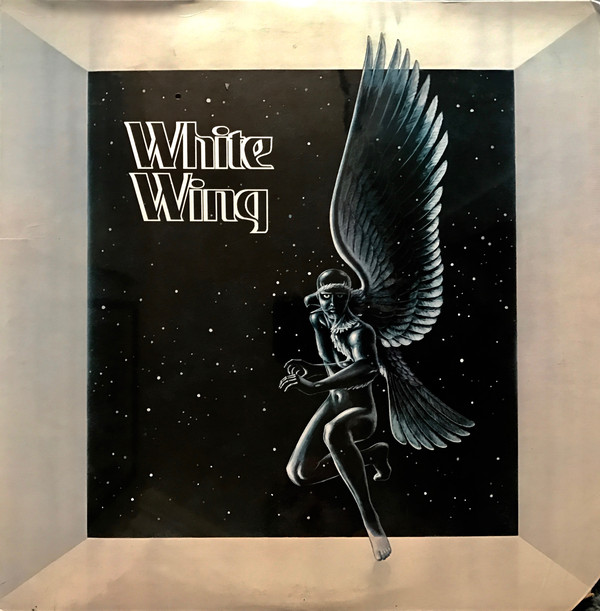
Wisconsin
Clicker (Clicker, 1973) (Madison)
Private press prog album from Madison, Wisconsin. First couple of tracks are straight forward early 70’s rock all the way, though they feature mellotron on the 2nd track. One of the rare places where I really think they used the instrument as a strings sampler rather than as moody accompaniment. This is followed by an atmospheric acoustic guitar driven instrumental. Then a Yes-like proggy piece, having that uniquely Midwestern approach (e.g. Starcastle or Albatross). Another rocker and a short quirky instrumental close out Side 1. Side 2 starts with an amalgamation of their prog and rock tendencies. This leads to the 16 minute closer. After a silly 2 minute introductory narrative, we are treated to a surprisingly great jazz rock instrumental, though there’s an overlong and somewhat uninteresting guitar noodle solo section (with no other accompanying instruments). A nice album that grows on you. The good parts are really good. Sold LP on Hemisphere.
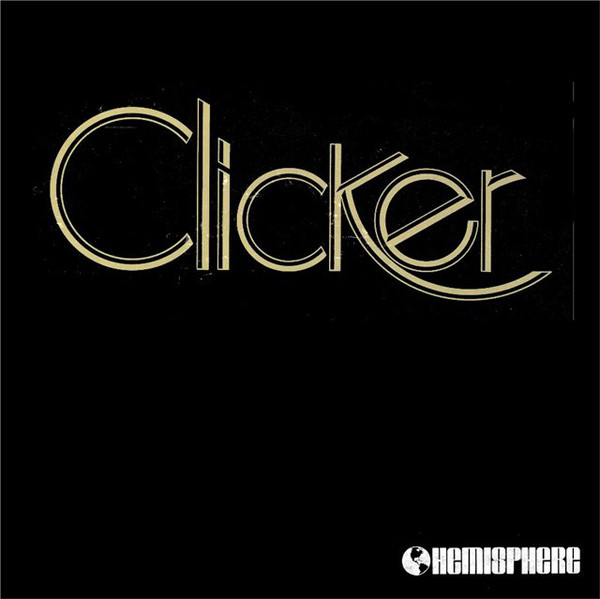
Sunblind Lion (Observer, 1976) (Plymouth, between Milwaukee and Green Bay)
Sunblind Lion were a band from eastern Wisconsin who played a familiar type of music from the Midwest region – that of progressive rock mixed with FM radio sensibilities. Likely they were geared toward the former, but to earn a living they mixed in the latter for both club gigs and the rare chance they might get “discovered”. All things considered, Sunblind Lion were one of the more successful bands at this racket, and managed a nice 3 album run. And based on supply and demand economics, it would appear their privately made debut album sold quite well in the local market, given the sheer amount of product that is still available.
The album opens fantastically with the hard driving Kansas styled ‘Ride the Wind’, with riffing guitars, heavy synthesizers, and ripping organ. Things break down quickly with the club pleasing boogie rock of ‘Cat Eyes’ and is best skipped over. ‘Jamaican Holiday’ was their choice for a single, and a good one. Mostly a very pleasant synthesizer lead commercial rock track that is well composed. But unfortunately some of the breaks have that honky-tonk boogie of a Bachman Turner Overdrive. Groan.
Fortunately from here on out, the theme is more progressive than commercial. ‘(Make It) Another Day’ will also remind one of mid 70s Kansas combined with a bit of southern rock ala The Allman Brothers. ‘Games of the Lonely’ has a very strong synthesizer presence, and could have also been a hit FM rock track of the era. ‘Spring Essence’ is the most purist of the progressive rock tracks here, and proves Sunblind Lion could have released a masterpiece of the style had they chosen. The 11 minute epic that closes the album is of course more of the same, though not quite as dynamic and takes awhile to get rolling. But once it does, it’s superb.
Overall, Sunblind Lion are yet another excellent example of the type of quality material coming from the American heartland of the 1970s. Strong album for fans of the style, but maybe only to them (us).
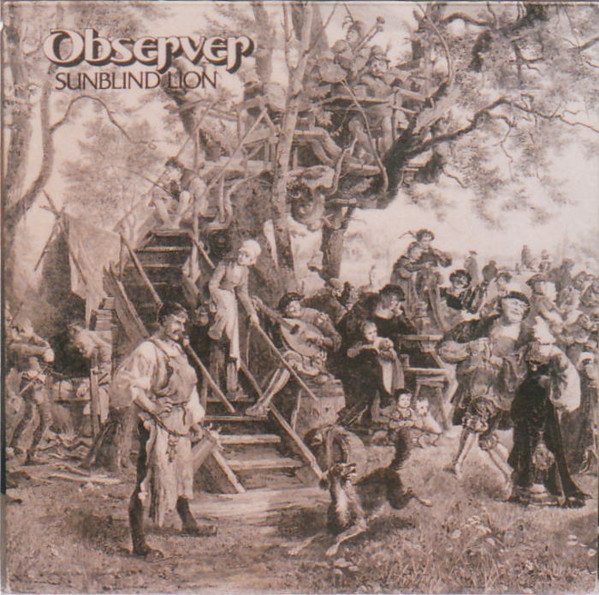
Traum (Milwaukee)
Once again, all we have is one recorded track, this time from a local radio comp called 93QFM Hometown Album Project. And the music fits perfect. Given the 1980 date, the music has a slight commercial feel, in addition to some folk add-ons. But the synthesizer work gives the game away: They’re proggy.
– Tom Hayes
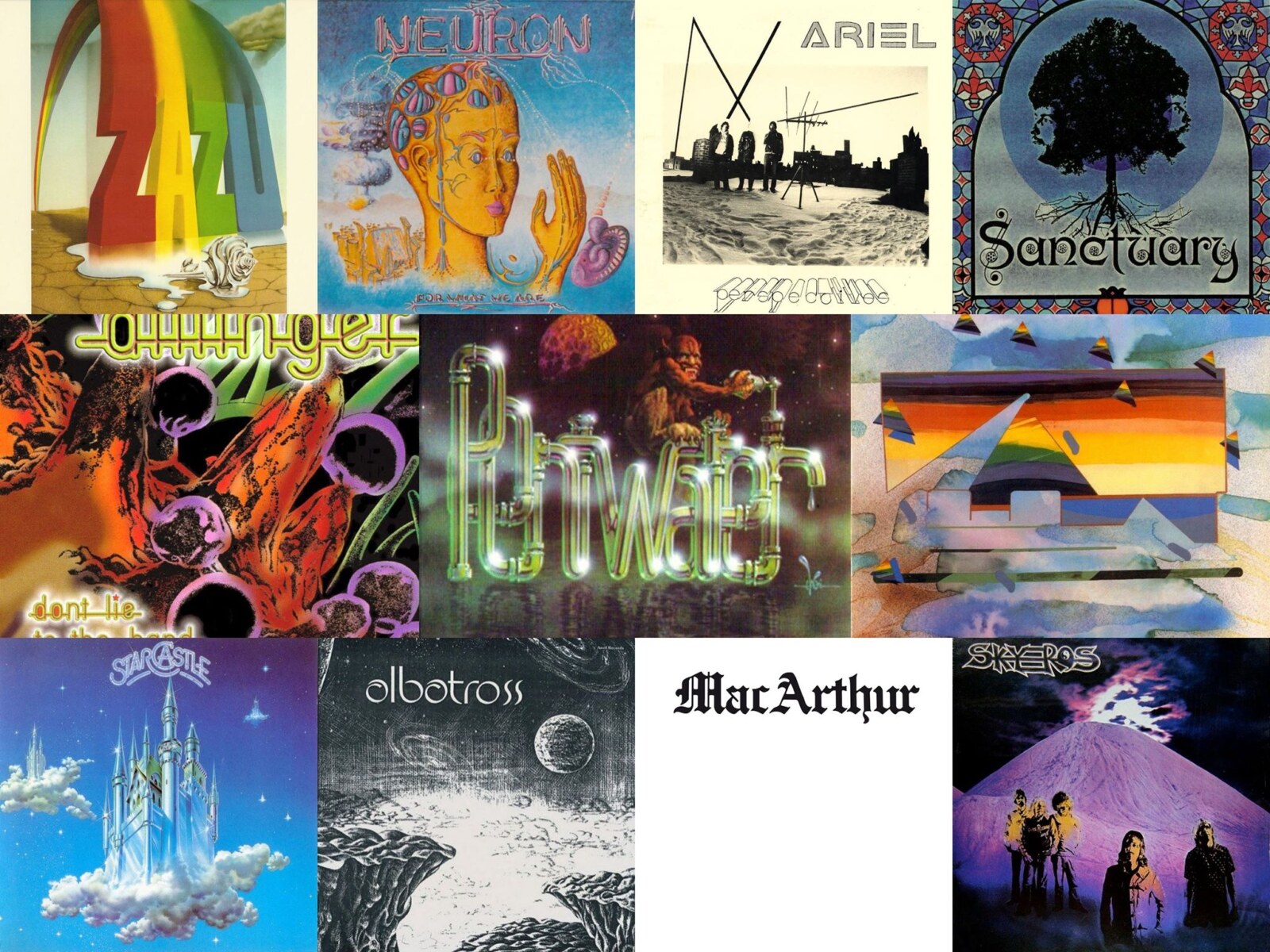

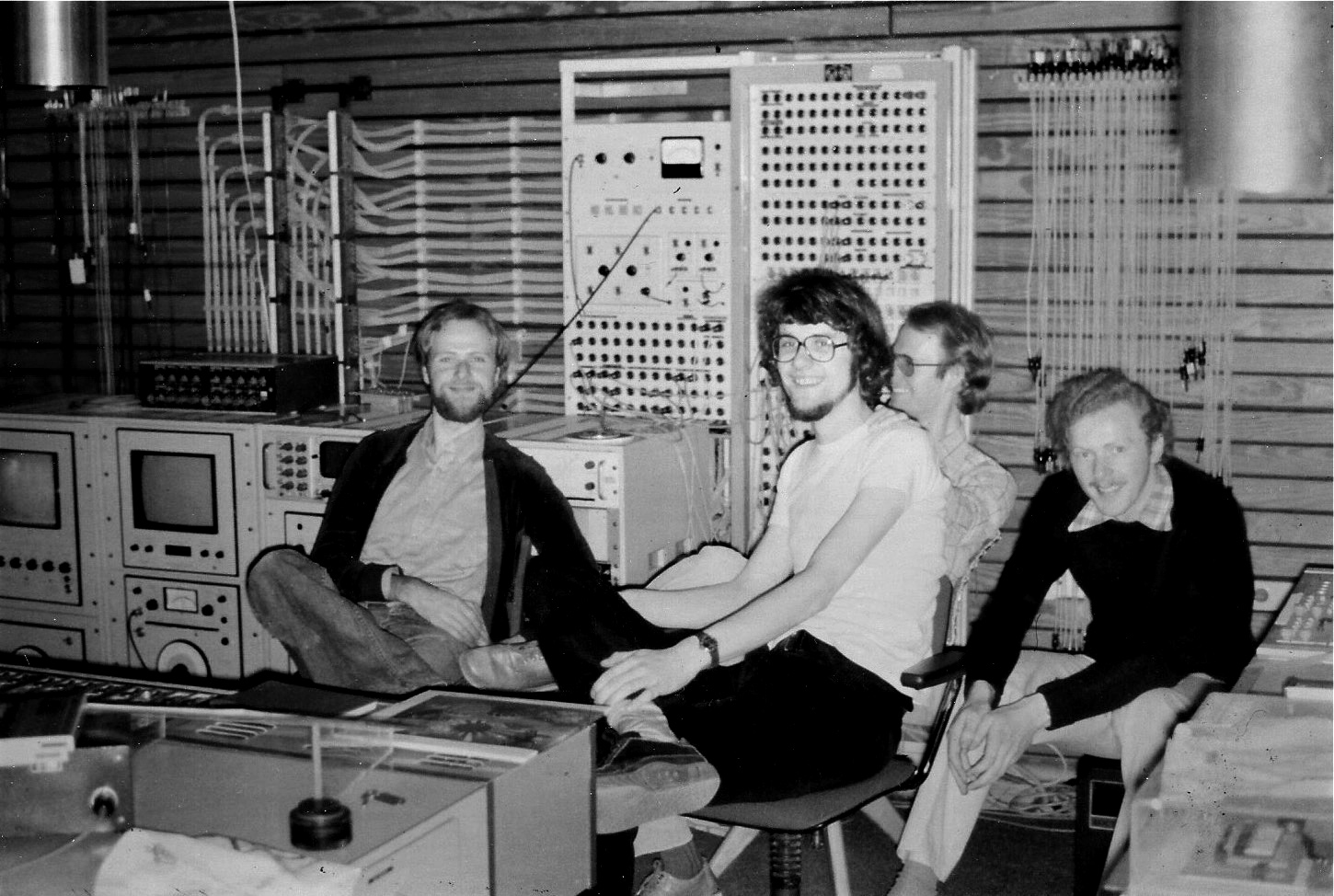
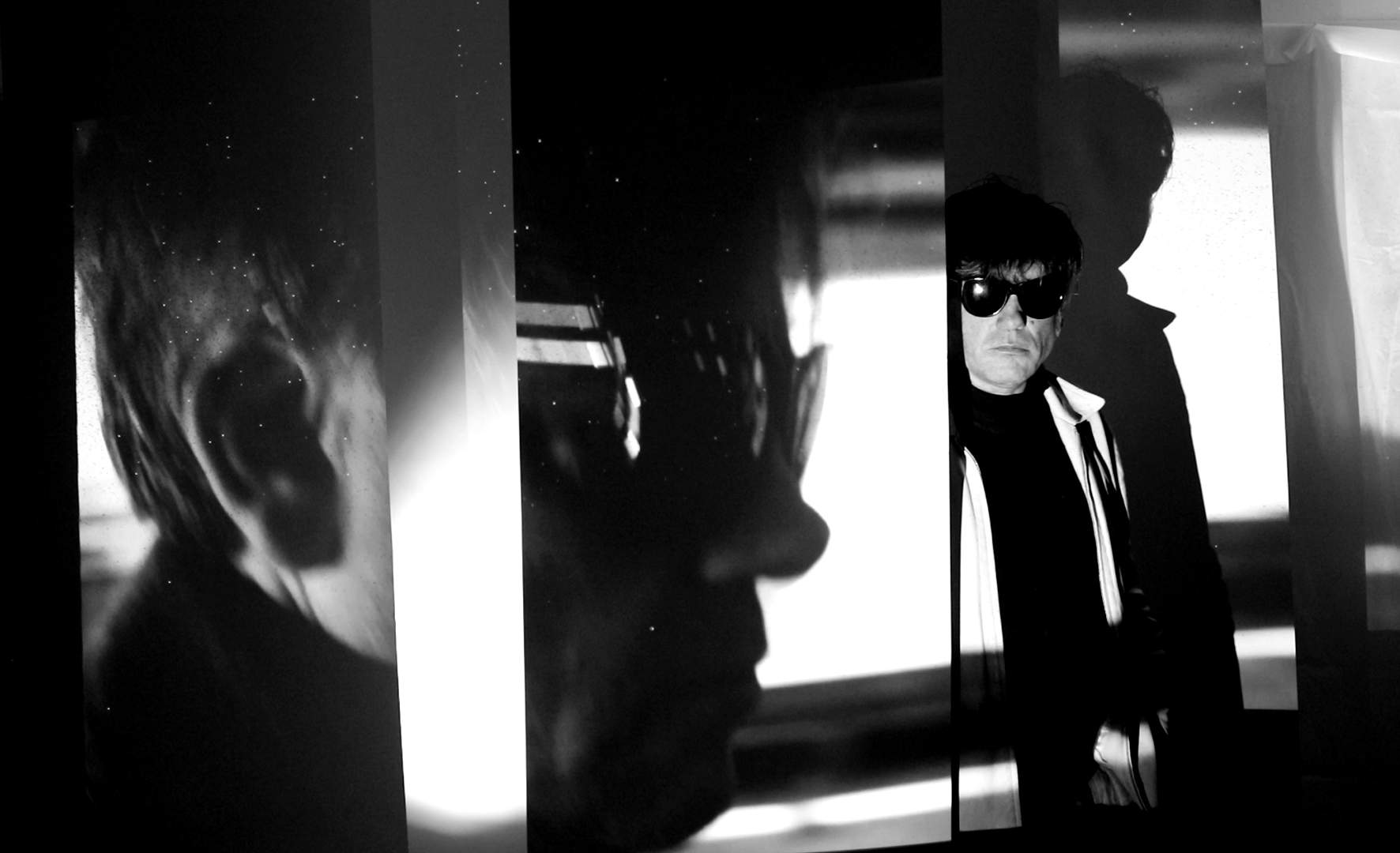
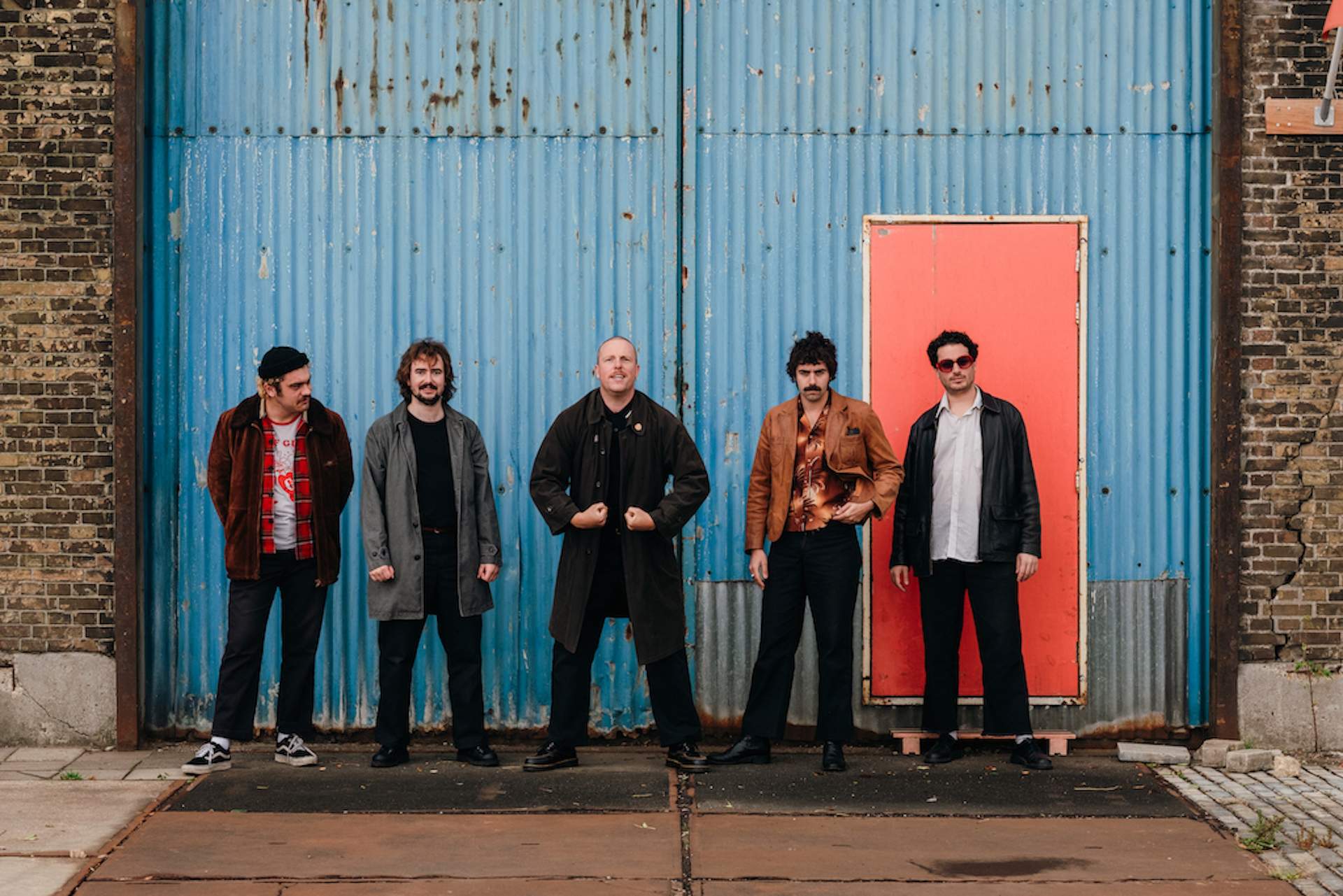
Nice article and an interesting list. It’s always good to know music and its history especially those from a better time.
Mystery Song! Heard on Chicago radio back in the 1970s. Can you help identify it? Listen here. https://www.youtube.com/watch?v=L-7hlEF4UIQ Unknown Progressive Rock song – “I Keep Looking” (Full Clip, Remastered) https://www.youtube.com/watch?v=-Dc9EFOaSLg Can anyone here identify this song??? Many of us are desperately wanting to know.
Another excellent band from Chicago (Morton Grove) was Gabriel Bondage. The released two albums, Angel Dust in 1975 and Another Trip To Earth in 1977 on Dharma Records.
Well written article. Did you not forget Sigmund Snopek and band from Milwaukee? They may not fall into that Midwest mold, but have that Zappa and Tubes West Coast vibe.
You seem to be a person who might be able to ID the “mystery prog rock” tape: https://www.youtube.com/watch?v=oUhDgiKqdd4
Great article. Thanks for writing it.
Xebec’s name choice predates the cover art of Jon Anderson’s epic “Olias” but was also conceptually thought by the band to be more of a spaceship than a seafaring vessel.
Hi Tom,
You said that you excluded Toronto’s guitar trio Triumph from your list, which might be understandable from their mid-80’s stuff, but their first three albums (if not first five, to a lesser extent) are directly concerned by your concerns. And I don’t mean only for Moonchild/Blinf$ding Light Show either.
You should maybe relisten to those three (avoid the incomplete partial compilation of their first two albums) and reconsider
Thx and keep up the excellent work
Cheers